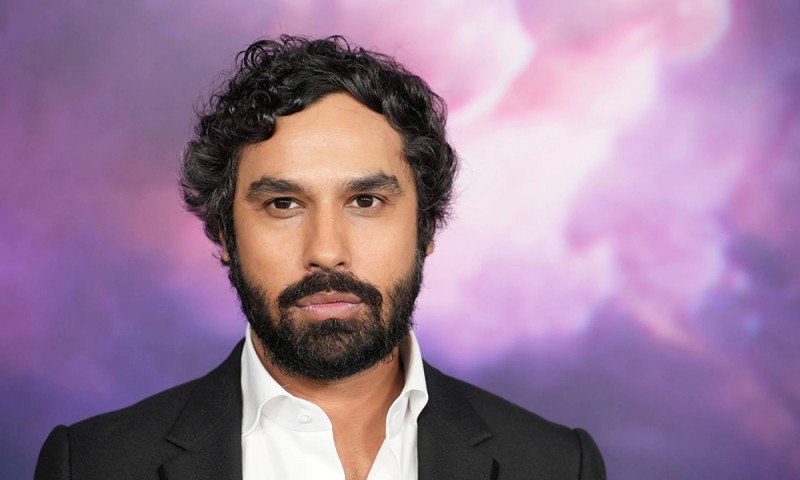
26岁时,昆瑙·内亚(Kunal Nayyar)凭借在《生活大爆炸》中饰演拉杰什·库萨帕里(Rajesh Koothrappali)一角,迎来了事业突破。他迅速走红,在该剧巅峰期每集片酬高达100万美元,成为电视史上收入最高的演员之一。
“我记得当时点了罗兰百悦(Laurie Perrier)桃红香槟——成瓶成瓶地点——感觉自己像个国王,享用着极尽奢华的晚餐,每道菜都配上松露,什么最贵就点什么,”他在接受《财富》独家专访时回忆道。
对内亚来说,这无疑是梦想成真。他18岁时从印度移民到美国读大学,满怀憧憬地立志在好莱坞闯出一片天地。“我投身演艺圈并非只想创作无人问津的艺术品,”现年44岁的他身兼演员、制片人和创始人,并表示自己曾立志成为“最伟大的演员”。
然而,香槟的气泡终会消散,掌声也渐渐远去,随之而来的寂静比成名时的喧嚣更令人窒息。
“我三十出头,就拥有了一切,”他补充道,“你以为这就能让你满足。你会想:等我成功了,清晨醒来时,生活就会充满蝴蝶与彩虹。”
“但事实是,没有什么能真正满足你。当你意识到你以为能给你答案的东西其实并不是答案时,那种处境既悲哀又可怕,”内亚坦言。
“你会遭遇那种‘接下来该做什么'的存在危机,内心感到一片空虚。”
当梦想全部实现,如何保持动力
如今,内亚的净资产估计达到4500万美元。此后他在荧幕上出演了更多角色,写了一本书,并创立了一系列企业,包括Good Karma Productions,以及最近推出的文件存储应用IQ121。
他表示,一旦登上顶峰——尤其是在拥有随时可以退出的财务自由后——要保持动力,首先必须学会与寂静共处。
“‘接下来该做什么'这个问题让我充满焦虑和恐惧。我一生都在不断追求、追求、再追求,可当我实现目标后,才意识到生活远不止于此,”他解释道。
“于是我转向内心,去了解真实的自己;这也是我经常给别人的建议:花时间去发现真实的自己,因为余生你将与这个‘自己'共度。”
内亚领悟到,满足感并非来自又一次试镜、又一笔交易,甚至不是又一张百万美元的支票:“你必须认清生命中真正重要的是什么。你必须意识到,生活不只是金钱和名声。”
“是与所爱之人共度时光。是培养真诚坦率的关系。是与善良的人相处,还有灵性修行、冥想、传播爱与善意,在生活中培养静默……”
如果你有幸获得巨额财富,内亚建议你真正去享受它。
“尽情享受吧。如果你有幸通过努力奋斗取得了某种成就,达到了某个地位,那就去享受吧,真的。这才是关键所在,”他补充道。
“如果你不停地取得成就、追逐、追逐、再追逐,直到某天生命走到尽头,你最后一刻的念头不会是'我真高兴取得了这么多成就',而会是‘我真希望多陪陪我爱的人',或者‘我真希望为人类多做些什么',或者‘我真的很怀念活着的这些点滴'。”
“所以无论如何,如果你有幸登上事业巅峰,就去享受吧。”
从爱彼迎到Wingstop UK,百万富翁们一致认为成功可能令人感到空虚
并非只有内亚一人在巨大成功之后感到空虚。
在联合创立Wingstop UK并以4亿英镑(约合5.32亿美元)出售多数股权后,汤姆·格罗根(Tom Grogan)坦言,获得财富后出人意料地感到“无聊”。
“七年来,你的全部心思都放在如何让这家企业成功上,”格罗根告诉《财富》。
“这是你唯一思考的事。可当你真正达到目标时,反而觉得有点不真实。就像,好了,现在完成了。然后呢?金钱也未必能填补那种空虚。”
同样,爱彼迎(Airbnb)的联合创始人兼首席执行官布莱恩·切斯基(Brian Chesky)此前曾承认,公司的首次公开募股(IPO)——尽管让他成为了亿万富翁——却是他人生中“最悲伤的时期之一”。
切斯基承认,在成长过程中他“极度渴望成功”,因为他认为成功会为他带来崇拜。加之他的父母都是社会工作者,绝不富裕,他也曾以为一大笔钱能“解决所有问题”。
但事实上,当爱彼迎估值达到1000亿美元,“高中时的所有人”都知道他的成就时,他却比以往任何时候都更加孤独——此前他每天投入长达18小时,将所有精力都倾注在工作中。
“在山脚下,你怀揣希望,”他总结自己从坚韧的初创公司创始人到亿万富翁的旅程时说道,“但问题是,当你登上山顶时,往往发现你孤身一人,与他人隔绝。”(*)
译者:中慧言-王芳
26岁时,昆瑙·内亚(Kunal Nayyar)凭借在《生活大爆炸》中饰演拉杰什·库萨帕里(Rajesh Koothrappali)一角,迎来了事业突破。他迅速走红,在该剧巅峰期每集片酬高达100万美元,成为电视史上收入最高的演员之一。
“我记得当时点了罗兰百悦(Laurie Perrier)桃红香槟——成瓶成瓶地点——感觉自己像个国王,享用着极尽奢华的晚餐,每道菜都配上松露,什么最贵就点什么,”他在接受《财富》独家专访时回忆道。
对内亚来说,这无疑是梦想成真。他18岁时从印度移民到美国读大学,满怀憧憬地立志在好莱坞闯出一片天地。“我投身演艺圈并非只想创作无人问津的艺术品,”现年44岁的他身兼演员、制片人和创始人,并表示自己曾立志成为“最伟大的演员”。
然而,香槟的气泡终会消散,掌声也渐渐远去,随之而来的寂静比成名时的喧嚣更令人窒息。
“我三十出头,就拥有了一切,”他补充道,“你以为这就能让你满足。你会想:等我成功了,清晨醒来时,生活就会充满蝴蝶与彩虹。”
“但事实是,没有什么能真正满足你。当你意识到你以为能给你答案的东西其实并不是答案时,那种处境既悲哀又可怕,”内亚坦言。
“你会遭遇那种‘接下来该做什么'的存在危机,内心感到一片空虚。”
当梦想全部实现,如何保持动力
如今,内亚的净资产估计达到4500万美元。此后他在荧幕上出演了更多角色,写了一本书,并创立了一系列企业,包括Good Karma Productions,以及最近推出的文件存储应用IQ121。
他表示,一旦登上顶峰——尤其是在拥有随时可以退出的财务自由后——要保持动力,首先必须学会与寂静共处。
“‘接下来该做什么'这个问题让我充满焦虑和恐惧。我一生都在不断追求、追求、再追求,可当我实现目标后,才意识到生活远不止于此,”他解释道。
“于是我转向内心,去了解真实的自己;这也是我经常给别人的建议:花时间去发现真实的自己,因为余生你将与这个‘自己'共度。”
内亚领悟到,满足感并非来自又一次试镜、又一笔交易,甚至不是又一张百万美元的支票:“你必须认清生命中真正重要的是什么。你必须意识到,生活不只是金钱和名声。”
“是与所爱之人共度时光。是培养真诚坦率的关系。是与善良的人相处,还有灵性修行、冥想、传播爱与善意,在生活中培养静默……”
如果你有幸获得巨额财富,内亚建议你真正去享受它。
“尽情享受吧。如果你有幸通过努力奋斗取得了某种成就,达到了某个地位,那就去享受吧,真的。这才是关键所在,”他补充道。
“如果你不停地取得成就、追逐、追逐、再追逐,直到某天生命走到尽头,你最后一刻的念头不会是'我真高兴取得了这么多成就',而会是‘我真希望多陪陪我爱的人',或者‘我真希望为人类多做些什么',或者‘我真的很怀念活着的这些点滴'。”
“所以无论如何,如果你有幸登上事业巅峰,就去享受吧。”
从爱彼迎到Wingstop UK,百万富翁们一致认为成功可能令人感到空虚
并非只有内亚一人在巨大成功之后感到空虚。
在联合创立Wingstop UK并以4亿英镑(约合5.32亿美元)出售多数股权后,汤姆·格罗根(Tom Grogan)坦言,获得财富后出人意料地感到“无聊”。
“七年来,你的全部心思都放在如何让这家企业成功上,”格罗根告诉《财富》。
“这是你唯一思考的事。可当你真正达到目标时,反而觉得有点不真实。就像,好了,现在完成了。然后呢?金钱也未必能填补那种空虚。”
同样,爱彼迎(Airbnb)的联合创始人兼首席执行官布莱恩·切斯基(Brian Chesky)此前曾承认,公司的首次公开募股(IPO)——尽管让他成为了亿万富翁——却是他人生中“最悲伤的时期之一”。
切斯基承认,在成长过程中他“极度渴望成功”,因为他认为成功会为他带来崇拜。加之他的父母都是社会工作者,绝不富裕,他也曾以为一大笔钱能“解决所有问题”。
但事实上,当爱彼迎估值达到1000亿美元,“高中时的所有人”都知道他的成就时,他却比以往任何时候都更加孤独——此前他每天投入长达18小时,将所有精力都倾注在工作中。
“在山脚下,你怀揣希望,”他总结自己从坚韧的初创公司创始人到亿万富翁的旅程时说道,“但问题是,当你登上山顶时,往往发现你孤身一人,与他人隔绝。”(*)
译者:中慧言-王芳
After securing his breakthrough role as Rajesh Koothrappali in The Big Bang Theory at just 26 years old, Kunal Nayyar quickly rose to fame, earning a staggering $1 million per episode at the height of the show's success and becoming one of the highest-paid actors on television ever.
“I remember ordering Laurie Perrier rosé champagne—just bottles of it—and feeling like a king, having a really lavish dinner with truffles on everything, and the most expensive, whatever it was,” he recalls in an exclusive interview with Fortune.
It was a dream come true for Nayyar, who immigrated from India to the US at 18 years old for college, with bright eyes set on making it big in Hollywood. “I didn't do it just because I wanted to create a piece of art that no one would watch,” the now 44-year-old actor, producer, and founder says, adding that he wanted to be “the greatest.”
But eventually the champagne bubbles go flat, the applause fades, and the stillness that follows can feel louder than fame.
“I was in my early 30s, and I had everything,” he adds. “You think it's going to be the thing that satisfies you. You think: When I make it, then I'll finally wake up in the morning and there'll be butterflies and rainbows.”
“But the truth is, nothing can satisfy you and that can be a sad and a scary place to be to realize the thing that was going to give you the answer is not the thing,” Nayyar admits.
“You're met with that existential crisis of what's next, and you feel empty.”
How to stay motivated when you've achieved all your dreams
Today, Nayyar has an estimated $45 million net worth. He's since starred in many more roles on our screens, written a book, and has a string of ventures to his name, including Good Karma Productions and most recently, a document storing app, IQ121.
He says staying motivated once you've reached the top—especially when you have the financial freedom to walk away—meant first learning how to live with stillness.
“My what next was met with a lot of anxiety and fear. My whole life was just spent achieving, achieving, achieving, and then when I achieved, I had to realize there's more to life than just this,” he explains.
“So I turned inward to get to know who I truly am; And that's what advice I always give people, is spend time discovering who you truly are, because that's the one you're going to live with for the rest of your life.”
Nayyar has learned that أيضاً doesn't come from another audition, another deal, or even another million-dollar paycheck: “You have to realize what's real in your life. You have to realize that it's not just money and fame.”
“It's spending time with people you love. It's cultivating honest and true relationships. It's spending time with good people, also spiritual practice, meditation, spreading love and kindness, cultivating silence in your life…”
And if you're ever lucky enough to have a huge windfall, Nayyar suggests trying to actually enjoy it.
“Just have fun. If you have been blessed in your life to work hard for something and you've achieved a certain position in your life, go enjoy yourself, literally. That's the point of it,” he adds.
“If you keep achieving and chasing and chasing and chasing and chasing, and one day, your time comes and it's over, and your last breath will not be, I'm so glad I achieved so much your last breath is going to be. I really wish I had spent time with people I love, or I really wish I had done more for humanity, or, I'm really going to miss this about living.”
“So no matter what, if you're lucky enough to reach the pinnacle of your career, go enjoy yourself.”
From Airbnb to Wingstop UK, millionaires agree that success can feel hollow
Nayyar isn't alone in feeling the emptiness that can follow huge success.
After cofounding Wingstop UK and selling a majority stake for £400 million ($532 million), Tom Grogan admitted coming into wealth was surprisingly “boring.”
“For seven years, your whole mind is occupied on making a success of this business,” Grogan told Fortune.
“It's all you think about. And then when you get there, it's just a bit surreal. It's like, Okay, it's done now. Now what? And money doesn't necessarily fill that void either.”
Likewise, Brian Chesky cofounder and CEO of Airbnb, previously admitted that his company's IPO—despite making him a billionaire—was “one of the saddest periods” of his life.
Growing up, Chesky admits he “desperately wanted to be successful” because he thought it would bring him adoration. Plus, having social worker parents who were by no standards rich, he also thought a large sum of money could “solve every problem.”
But actually, when Airbnb hit that $100 billion valuation and “everyone in high school” knew what he did, he was lonelier than ever, having poured all his energy into his work for up to 18 hours a day.
“At the bottom of the mountain, you have hope,” he concludes of his journey from scrappy start-up founder to billionaire. “But the problem is when you get to the top of the mountain, oftentimes you are at the top by yourself, disconnected.”

